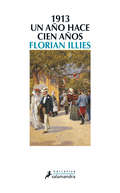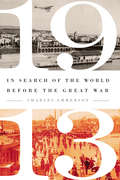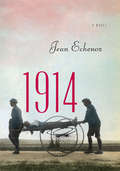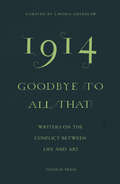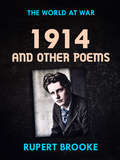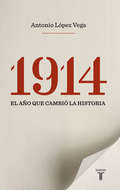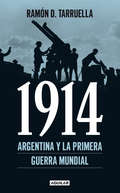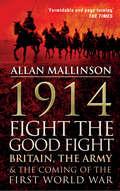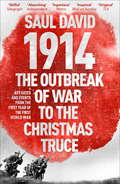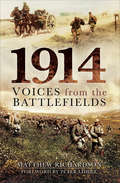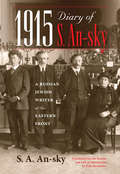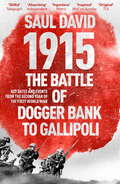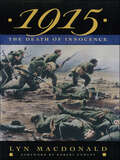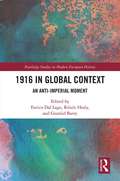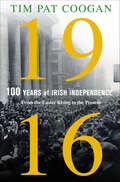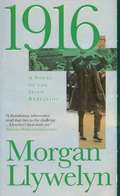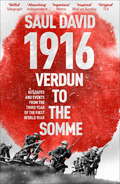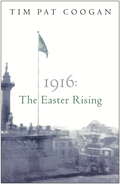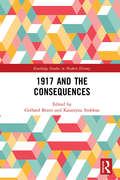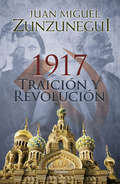- Table View
- List View
1913. Un año hace cien años: Un año hace cien años
by Florian IlliesCon un estilo elegante y un fino sentido del humor, Florian Illies ha reunido un fascinante catálogo de anécdotas, apuntes, citas y extractos de diarios y otros textos de la época para recrear con extraordinaria naturalidad la magia y la emoción de un momento clave de la cultura europea, con múltiples ecos en nuestro comprometido presente. Los primeros años del siglo XX fueron un período especialmente fructífero para la creatividad humana. Europa era un hervidero de nuevas ideas y tendencias que surgían por doquier. Política, ciencia, música, pintura, arquitectura, literatura: en todos los campos se ponían en entredicho los valores tradicionales, y el sentimiento general era de cambio y revolución, un tiempo en el que todo parecía posible. En este original relato, el historiador y periodista Florian Illies nos transporta cien años atrás para describirnos qué pensaban y cómo actuaban algunos de los protagonistas de la escena europea a lo largo de 1913. Proust busca el tiempo perdido, Freud desnuda almas en su diván, Stravinski celebra la primavera, Kafka, Joyce y Musil toman el mismo día un café en Trieste... Y en el parque del castillo de Schönbrunn, Hitler y Stalin se pasean en lo que será su único encuentro. Así pues, el triunfo y la melancolía se funden, todo es pulsión creativa, pero, a su vez, el ser humano parece haber perdido la inocencia y, de alguna manera, se intuye el abrupto declive que se avecina. Después de 1913, claro está, Europa se precipita en el abismo. La crítica ha dicho...«Florian Illies es una suerte de narrador que deambula por la Historia creando, hábil y juguetonamente, un mosaico de 1913 a partir de acontecimientos reales y personajes históricos. [...] no elabora su obra desde la perspectiva de un erudito, sino desde la de un artista de la palabra, un narrador con un sentido de la dramaturgia y del efectismo muy desarrollado.»Die Welt«Illies hace desaparecer los cien años que existen entre 1913 y sus lectores actuales [...]. Qui quiera enfrentarnos a una sencilla verdad: un esplendor así, semejante riqueza, puede irse a pique de la noche a la mañana [...]. 1913 se convierte de este modo en el libro más fastuoso acerca de la crisis.»Süddeutsche Zeitung «Una de las mayores satisfacciones que proporciona este libro son sus relatos acerca de la tristeza, el aburrimiento, la inquietud y la sensación de que posiblemente todo sea en vano, por lo que en lugar de ir a trabajar por ahora será mejor meterse en la cama o viajar a la costa para calmar los nervios y la sobreexcitación.»Frankfurter Allgemeine Sonntagszeitung «Un collage delicado, a medio camino entre la empatía y la paciencia para los rompecabezas, una lectura apasionante que juega a hacer bromas con la historia del pensamiento.»Der Spiegel
1913: In Search of the World Before the Great War
by Charles EmmersonToday, 1913 is inevitably viewed through the lens of 1914: as the last year before a war that would shatter the global economic order and tear Europe apart, undermining its global pre-eminence. Our perspectives narrowed by hindsight, the world of that year is reduced to its most frivolous features?last summers in grand aristocratic residences?or its most destructive ones: the unresolved rivalries of the great European powers, the fear of revolution, violence in the Balkans. In this illuminating history, Charles Emmerson liberates the world of 1913 from this ?prelude to warOCO narrative, and explores it as it was, in all its richness and complexity. Traveling from EuropeOCOs capitals, then at the height of their global reach, to the emerging metropolises of Canada and the United States, the imperial cities of Asia and Africa, and the boomtowns of Australia and South America, he provides a panoramic view of a world crackling with possibilities, its future still undecided, its outlook still open. The world in 1913 was more modern than we remember, more similar to our own times than we expect, more globalized than ever before. The Gold Standard underpinned global flows of goods and money, while mass migration reshaped the worldOCOs human geography. Steamships and sub-sea cables encircled the earth, along with new technologies and new ideas. FordOCOs first assembly line cranked to life in 1913 in Detroit. The Woolworth Building went up in New York. While Mexico was in the midst of bloody revolution, Winnipeg and Buenos Aires boomed. An era of petro-geopolitics opened in Iran. China appeared to be awaking from its imperial slumber. Paris celebrated itself as the city of light?Berlin as the city of electricity. Full of fascinating characters, stories, and insights, "1913: In Search of the World before the Great War" brings a lost world vividly back to life, with provocative implications for how we understand our past and how we think about our future.
1914
by Linda Coverdale Jean EchenozFive Frenchmen go off to war, two of them leaving behind a certain young woman who longs for their return. But the main character in 1914 is the Great War itself. Jean Echenoz, the multi-award-winning French literary magician whose work has been compared to Joseph Conrad and Lawrence Sterne, has brought that deathtrap back to life, leading us gently from a balmy summer day deep into the insatiable-and still unthinkable-carnage of trench warfare.With the delicacy of a miniaturist and with irony both witty and clear-eyed, the author offers us an intimate epic with the atmosphere of a classic movie: in the panorama of a clear blue sky, a biplane spirals suddenly into the ground; a tardy piece of shrapnel shears the top off a man's head as if it were a soft-boiled egg; we dawdle dreamily in a spring-scented clearing with a lonely shell-shocked soldier strolling innocently to a firing squad ready to shoot him for desertion.But ultimately, the grace notes of humanity in 1914 rise above the terrors of war in this beautifully crafted tale that Echenoz tells with discretion, precision, and love.
1914 - Goodbye to All That
by Jeanette Winterson Colm Toibin Elif Shafak Erwin Mortier Lawinia GreenlawIn this collection of essays, ten leading writers from different countries consider the conflicts that have informed their own literary lives. 1914-Goodbye to All That borrows its title from Robert Graves's "bitter leave-taking of England" in which he writes not only of the First World War but the questions it raised: how to live, how to live with each other, and how to write. Interpreting this title as broadly and ambiguously as Graves intended, these essays mark the War's centenary by reinvigorating these questions. The book includes Elif Shafak on an inheritance of silence in Turkey, Ali Smith on lost voices in Scotland, Xiaolu Guo on the 100,000 Chinese sent to the Front, Daniel Kehlmann on hypnotism in Berlin, Colm Toibin on Lady Gregory losing her son fighting for Britain as she fought for an independent Ireland, Kamila Shamsie on reimagining Karachi, Erwin Mortier on occupied Belgium's legacy of shame, NoViolet Bulawayo on Zimbabwe and clarity, Ales Steger on resisting history in Slovenia, and Jeanette Winterson on what art is for. Contributors include: Ali Smith - Scotland Ales Steger - Slovenia Jeanette Winterson - England Elif Shafak - Turkey NoViolet Bulawayo - Zimbabwe Colm Toíbín - Ireland Xiaolu Guo - China Erwin Mortier - Belgium Kamila Shamsie - Pakistan Daniel Kehlmann - GermanyFrom the Trade Paperback edition.
1914 and Other Poems (The World At War)
by Rupert BrookeRupert Brooke had planned to put together a second collection of poetry for the spring of 1915. However he died of blood-poisoning while serving in World War I and this collection was published posthumously in 1915. It includes the celebrated poem "The Old Vicarage, Granchester". (Amazon)
1914, el año que cambió la historia
by Antonio López VegaMucho más que la Primera Guerra Mundial. Un libro fascinante para entender la auténtica dimensión de un año clave en la historia. <P><P>1914 ha solido concitar la atención de los historiadores por marcar el inicio de la Gran Guerra. Sin embargo, aquel año tuvieron lugar otros muchos acontecimientos, reflejo de las profundas transformaciones que, a nivel mundial, pusieron fin al largo siglo XIX y dieron comienzo al corto siglo XX - por decirlo con la feliz expresión de Eric Hobsbawm -. <P> Sucesos como el ataque a la Venus del espejo por parte de Mary Richardson, el discurso de Ortega y Gasset «Vieja y nueva política», la toma de Veracruz por los marines estadounidenses, el estreno de El ruiseñor de Igor Stravinsky, los asesinatos de Francisco Fernando y de Jean Jaurès, la apertura del canal de Panamá o la llegada al pontificado de Benedicto XV ponían de relieve los cambios que estaban aconteciendo en todos los órdenes - político, económico, social, cultural, relaciones internacionales, etc... <P>Aquel año fue así testigo del apogeo de la reivindicación sufragista, de la presencia de los intelectuales en la vida pública, de la emergencia de Estados Unidos como gran potencia, de la eclosión de la vanguardia artística, de la irrupción del nacionalismo etnicista de tono violento, de la pugna entre revolucionarios y posibilistas en el seno del movimiento obrero o del malestar de la fe religiosa con la modernidad. <P>Acontecimientos todos ellos que hacen de 1914 mucho más que el año de la Gran Guerra: fue el año que cambió la historia. Este libro se fija en todo ello. <P>Con ritmo vibrante y de la mano magistral de Antonio López Vega, el lector se introducirá en el ambiente de 1914 a través de acontecimientos singulares que cambiaron para siempre la historia de la humanidad.
1914. Argentina y la Primera Guerra Mundial
by Alejandro C. Tarruella<P>Argentina y la Primera Guerra Mundial, un momento clave de la historia argentina, que marcó el curso del siglo XX. <P> Fines de junio de 1914, los diarios argentinos daban cuenta del asesinato del heredero del Imperio Austrohúngaro y su esposa, en la ciudad de Sarajevo. <P>Lo que entonces parecía un hecho más en los conflictos de la región de los Balcanes, pronto desencadenó el enfrentamiento que hoy conocemos como la Primera Guerra Mundial y que sus contemporáneos llamaron la Gran Guerra. <P>A cien años de esos acontecimientos, este libro reconstruye el impacto de la contienda en la Argentina, que por entonces vivía el tránsito entre el régimen conservador y el primer gobierno radical de Hipólito Yrigoyen. <P>La minuciosa investigación de Ramón Tarruella permite comprender un momento clave de la historia argentina, que marcó el curso del siglo XX. <P>Entre otros aspectos, 1914 recorre: * Los debates en torno a la neutralidad de nuestro país. * Las polémicas en la opinión pública y los partidos políticos. * La intensa actividad de las colectividades de inmigrantes europeos y las penurias económicas como resultado del conflicto. * Cómo se informaba y se formaba opinión, por medio de corresponsales como Leopoldo Lugones y Roberto Payró, entre otros destacados escritores. * Las limitaciones del modelo agroexportador vigente. * La declinación de Gran Bretaña y la creciente influencia de Estados Unidos como potencia mundial.
1914: Britain, the Army and the Coming of the First World War
by Allan Mallinson‘No part of the Great War compares in interest with its opening’, wrote Churchill. ‘The measured, silent drawing together of gigantic forces, the uncertainty of their movements and positions, the number of unknown and unknowable facts made the first collision a drama never surpassed…in fact the War was decided in the first twenty days of fighting, and all that happened afterwards consisted in battles which, however formidable and devastating, were but desperate and vain appeals against the decision of fate.’On of Britain's foremost military historians and defence experts tackles the origins - and the opening first few weeks of fighting - of what would become known as 'the war to end all wars'. Intensely researched and convincingly argued, Allan Mallinson explores and explains the grand strategic shift that occurred in the century before the war, the British Army’s regeneration after its drubbings in its fight against the Boer in South Africa, its almost calamitous experience of the first twenty days’ fighting in Flanders to the point at which the British Expeditionary Force - the 'Old Contemptibles' - took up the spade in the middle of September 1914: for it was then that the war changed from one of rapid and brutal movement into the more familiar vision of trench warfare on Western Front. In this vivid, compelling new history, Malliinson brings his experience as a professional soldier to bear on the circumstances, events, actions and individuals and speculates – tantalizingly – on what might have been...
1914: Key Dates and Events from the First Year of the First World War
by Saul DavidThis special ebook has been created by historian Saul David from his acclaimed work 100 Days to Vistory: How the Great War was Fought and Won, which was described by the Mail on Sunday as 'Inspired' and by Charles Spencer as 'A work of great originality and insight'. Through key dates from 4 August 1914, when Britain declared war, to the Christmas Truce of 24 December 1914, Saul David's gripping narrative is an enthralling tribute to a generation of men and women whose sacrifice should never be forgotten.
1914: The Outbreak of War to the Christmas Truce
by Saul DavidThis special ebook has been created by historian Saul David from his acclaimed work 100 Days to Vistory: How the Great War was Fought and Won, which was described by the Mail on Sunday as 'Inspired' and by Charles Spencer as 'A work of great originality and insight'. Through key dates from 4 August 1914, when Britain declared war, to the Christmas Truce of 24 December 1914, Saul David's gripping narrative is an enthralling tribute to a generation of men and women whose sacrifice should never be forgotten.
1914: Voices from the Battlefields
by Matthew RichardsonThe opening battles of WWI&’s Western Front and the world-changing advances in warfare are reexamined through eyewitness accounts from the trenches. The 1914 campaign of World War I, sparked by the German Army&’s invasion of Luxembourg, Belgium, and France, marked a watershed in military history. Advances in weaponry forced both sides to take to the earth in what became a grueling standoff of trench warefare. In a bizarre mix of ancient and modern, some of the last cavalry charges took place in the same theatre in which armoured cars, motorcycles and aeroplanes were beginning to make their presence felt. These dramatic developments were recorded in graphic detail by soldiers who were there in the trenches themselves. Now, with the benefit of these firsthand accounts, historian Matthew Richardson offers a thoroughgoing reassessment of the 1914 campaign. His vivid narrative emphasises the perspective of the private soldiers and junior officers of the British Army and includes full colour plates containing over one hundred illustrations. 1914: Voices from the Battlefields was a Britain At War Magazine Book of the Month in February 2014.
1915 Diary of S. An-sky: A Russian Jewish Writer at the Eastern Front (Encounters: Explorations in Folklore and Ethnomusicology)
by S. A. An-SkyThe WWI diary of the Russian Jewish activist and author of The Dybbuk presents &“an unforgettable portrait of life, culture, and destruction&” (Eugene Avrutin, author of Jews and the Imperial State). By the outbreak of World War I, S. An-sky was a well-known writer, a longtime revolutionary, and an ethnographer who pioneered the collection of Jewish folklore in Russia's Pale of Settlement. In 1915, An-sky took on the assignment of providing aid and relief to Jewish civilians trapped under Russian military occupation in Galicia. As he made his way through the shtetls there, close to the Austrian frontlines, he kept a diary of his encounters and impressions. In his diary, An-sky describes conversations with wounded soldiers in hospitals, fellow Russian and Jewish aid workers, and Jewish civilians living on the Eastern Front. He recorded the brutality and violence against the civilian population, the complexities of interethnic relations, the practices and limitations of philanthropy and medical care, Russification policies, and antisemitism. In the late 1910s, An-sky used his diaries as raw material for a lengthy memoir in Yiddish, published under the title The Destruction of Galicia. Although most of An-sky&’s original diaries were lost, two fragments are preserved in the Russian State Archive of Literature and Art. Translated and annotated here by Polly Zavadivker, these fragments convey An-sky's vivid perceptions and enlightening insights.
1915: Key Dates and Events from the Second Year of the First World War
by Saul DavidThis special ebook has been created by historian Saul David from his acclaimed work 100 Days to Vistory: How the Great War was Fought and Won, which was described by the Mail on Sunday as 'Inspired' and by Charles Spencer as 'A work of great originality and insight'. Through key dates from the Battle of Dogger Bank on 24th January 1914, to the Gallipoli landings, Saul David's gripping narrative is an enthralling tribute to a generation of men and women whose sacrifice should never be forgotten.
1915: The Battle of Dogger Bank to Gallipoli
by Saul DavidThis special ebook has been created by historian Saul David from his acclaimed work 100 Days to Vistory: How the Great War was Fought and Won, which was described by the Mail on Sunday as 'Inspired' and by Charles Spencer as 'A work of great originality and insight'. Through key dates from the Battle of Dogger Bank on 24th January 1914, to the Gallipoli landings, Saul David's gripping narrative is an enthralling tribute to a generation of men and women whose sacrifice should never be forgotten.
1915: The Death of Innocence
by Lyn MacdonaldLyn Macdonald's 1915: The Death of Innocence is a uniquely compelling blend of military history and poignant memories of the fighters who survived the ordeal. By Christmas 1915, the wild wave of enthusiasm that had sent men flocking to join up a few months earlier had begun to tail off, and though the Regulars of the original Expeditionary Force had suffered 90 percent casualties, most, particularly the soldiers themselves, still believed that 1915 would see the breaking of the deadlock. Their hopes were shattered on the bloody battlefields at Neuve Chapelle, at Ypres, at Loos, and far away on the shores of Gallipoli. Generals failed to understand the importance of heavy howitzers and machine guns, convinced that wars were won by the cavalry. They could not imagine a war in which hundreds of advancing troops could be wiped out in minutes by machine-gun fire. As disillusionment began to set in and grim resolve replaced easy optimism, innocence was among the casualties in the trenches that ran through the Flanders swamps. The story of 1915 is stark, brutal, frank, sometimes painfully funny, always human. Above all, it is history from the ground up, told from the point of view of the men themselves. Never before has any writer collected so many firsthand accounts of the experiences of ordinary soldiers, through diaries, letters, and interviews with survivors--and it is the dogged heroism and sardonic humor of the soldiers that shine through the pages of Lyn Macdonald's epic narrative.
1916
by Morgan LlywelynHistorical novel of the struggle for Irish independence, seen through the eyes of a young Irish partisan.
1916 in Global Context: An anti-Imperial moment (Routledge Studies in Modern European History)
by Enrico Dal Lago Róisín Healy Gearóid BarryThe year 1916 has recently been identified as "a tipping point for the intensification of protests, riots, uprisings and even revolutions." Many of these constituted a challenge to the international pre-war order of empires, and thus collectively represent a global anti-imperial moment, which was the revolutionary counterpart to the later diplomatic attempt to construct a new world order in the so-called Wilsonian moment. Chief among such events was the Easter Rising in Ireland, an occurrence that took on worldwide significance as a challenge to the established order. This is the first collection of specialist studies that aims at interpreting the global significance of the year 1916 in the decline of empires.
1916: 100 Years of Irish Independence From the Easter Rising to the Present
by Tim Pat CooganThere’s before 1916 and then there’s after. Between them lies the Easter Rising, when Irish republicans took up arms against British rule and changed the course of their country’s history forever. For though the resistance failed, it failed gloriously; the rebels were no longer a group of cranks and troublemakers in the public eye, but martyrs and national heroes, their example set the way for others and their mission lived on through the century to come. But what sort of country did the Rising create? And how does post-1916 Ireland compare with the aspirations of the rebellion’s leaders, the hopes of Thomas MacDonagh and John MacBride, of James Connolly and Patrick Pearse?One hundred years later, Tim Pat Coogan offers a personal perspective on the Irish experience that followed the Rising. He charts a flawed history that is marked as much by complacency, corruption, and institutional abuse as it is by the building of a nation and the sacrifices of the Republic’s founding fathers.
1916: A Novel of the Irish Rebellion
by Morgan LlywelynAt age fifteen, Ned Halloran lost both of his parents--and almost his own life--when the Titanic sank. Determined to keep what little he has, he returns to his homeland of Ireland and enrolls at Saint Edna's school in Dublin. Saint Edna's headmaster is the renowned scholar and poet, Patrick Pearse--who is soon to gain greater fame as a rebel and patriot. Ned becomes deeply involved with the growing revolution . . . and the sacrifices it will demand.Through Ned's eyes, Morgan Llywelyn's 1916 examines the Irish fight for freedom--inspired by poets and schoolteachers, fueled by a desperate desire for independence, and played out in the historic streets of Dublin against the background of World War I. It is a story of the brave men and heroic women who, for a few unforgettable days, managed to hold out against the might of the British Empire.
1916: Key Dates and Events from the Third Year of the First World War
by Saul DavidThis special ebook has been created by historian Saul David from his acclaimed work 100 Days to Victory: How the Great War was Fought and Won, which was described by the Mail on Sunday as 'Inspired' and by Charles Spencer as 'A work of great originality and insight'. Through key dates from the introduction of conscription in Britain on 27 January 1916, to the first day of the Somme on 1 July 1916, Saul David's gripping narrative is an enthralling tribute to a generation of men and women whose sacrifice should never be forgotten.
1916: The Easter Rising
by Tim Pat CooganThe Easter Rising began at 12 noon on 24 April, 1916 and lasted for six short but bloody days, resulting in the deaths of innocent civilians, the destruction of many parts of Dublin and the true beginning of Irish independence. The 1916 Rising was born out of the Conservative and Unionist parties' illegal defiance of the democratically expressed wish of the Irish electorate for Home Rule; and of confusion, mishap and disorganisation, compounded by a split within the Volunteer leadership. Tim Pat Coogan introduces the major players, themes and outcomes of a drama that would profoundly affect twentieth-century Irish history. Not only is this the story of a turning point in Ireland's struggle for freedom, but also a testament to the men and women of courage and conviction who were prepared to give their lives for what they believed was right.
1916: The Easter Rising (10 MINUTE SERIES)
by Tim Pat CooganThe Easter Rising began at 12 noon on 24 April, 1916 and lasted for six short but bloody days, resulting in the deaths of innocent civilians, the destruction of many parts of Dublin and the true beginning of Irish independence. The 1916 Rising was born out of the Conservative and Unionist parties' illegal defiance of the democratically expressed wish of the Irish electorate for Home Rule; and of confusion, mishap and disorganisation, compounded by a split within the Volunteer leadership. Tim Pat Coogan introduces the major players, themes and outcomes of a drama that would profoundly affect twentieth-century Irish history. Not only is this the story of a turning point in Ireland's struggle for freedom, but also a testament to the men and women of courage and conviction who were prepared to give their lives for what they believed was right.
1916: Verdun to the Somme
by Saul DavidThis special ebook has been created by historian Saul David from his acclaimed work 100 Days to Victory: How the Great War was Fought and Won, which was described by the Mail on Sunday as 'Inspired' and by Charles Spencer as 'A work of great originality and insight'. Through key dates from the introduction of conscription in Britain on 27 January 1916, to the first day of the Somme on 1 July 1916, Saul David's gripping narrative is an enthralling tribute to a generation of men and women whose sacrifice should never be forgotten.
1917 and the Consequences (Routledge Studies in Modern History)
by Gerhard Besier Katarzyna Stok 322 OsaThe Russian Revolution of 1917 has been one of the most important events of modern history. It changed the course of the events not only in Russia but, on a wider scale, across the world while it influenced the flow of history throughout the twentieth century until the fall of the Soviet Union and, to some extent, well beyond this time. Radical change in Russia triggered social revolutions and reformations across Europe, while authoritarian systems shaped their societies according to the Russian model. This book analyses these forces, particularly at the European periphery which has been underexplored until this volume.
1917. Traición y revolución
by Juan Miguel ZunzuneguiUna historia del amor separado por las ideologías y la única revolución que nunca ha triunfado. Europa se desangra en la Primera Guerra Mundial, millones de cadáveres rusos y alemanes yacen en el frente oriental, mientras los poderosos se reparten el mundo. Desde Londres hasta Constantinopla, y de San Petersburgo a Berlín, los ejércitos, espías, revolucionarios y agentes secretos destruyen los antiguos imperios y forjan los cimientos de un nuevo mundo. En medio de la guerra de Europa y de la revolución soviética, el misterioso agente norteamericano John Mann investiga la trama de toda una conspiración que involucra la muerte del misterioso Rasputín, la caída del Zar, las maquinaciones de Stalin y las estrategias de Trotsky, el reparto de Medio Oriente, a los árabes y turcos, a los bolcheviques y alemanes, y al arma más poderosa del Kaiser en su guerra contra el Imperio Ruso: Vladimir Lenin. La historia quecomienza en 1917 termina el 9 de noviembre de 1989 con la caída del Muro de Berlín. Anastasia y Konstantin, dos sobrevivientes de la revolución soviética, separados por el muro, narran su versión de los hechos mientras buscan reencontrarse. Una historia del amor separado por las ideologías, de los eternos sueños frustrados de la humanidad, y de la única revolución que nunca ha triunfado.
